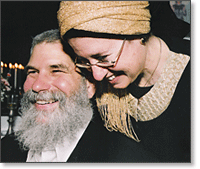In Tzav’s six opening verses, the Torah sets down the laws about the elevation offering brought by the cohanim each morning on the Tabernacle and Temple altars. Over a span of only six verses, the
word fire occurs four times and the admonition not to let the fire on the altar be extinguished is repeated twice. Kabbalah and Chassidut teach that the Temple service is, among other things, a paradigm for each person’s quest to come nearer to God and find one’s purpose and the rectification one need’s to undergo in this world. Therefore it behooves us to look deeper into the symbol of the fire on the altar to glean constructive teachings for life.
In general the perpetual fire on the altar represents the obligation to continuously serve God and be constantly aware of His Presence and existence. Whether at work or at play, during the week or on Shabbat and holidays, whether feeling elevated or dejected, the service of God as defined by the Torah never ceases. Every situation in life affords the opportunity to experience God, perform mitzvot, and bring light, healing, and rectification to ourselves and the world.
On a deeper level fire represents the soul’s longing to flame upwards and express its passionate desire to be unified with God. Fire symbolizes an exuberant love of life and the yearning to serve God. When Rabbi Shlomo Carlebach was in the midst of teaching a class, leading a prayer service, or performing at a concert and he felt that the congregation or audience lacked enthusiasm, he would stop and plead with everyone by yelling out: “More fire!! More fire!!” This usually did the trick by “upping the voltage” and breaking the spell of complacency.
The idea of fire is also intimately connected to joy (simchah), which in Hebrew begins with the letter shin, the letter symbolizing fire. The Hebrew word for fire (aish) is comprised of the letters alef and shin. In the book of Deuteronomy (28:47), the Torah warns the Jewish people that future exiles would occur because “you did not serve Your God with joy.” The Arizal explained this verse quite literally, on both national and individual terms. This was precisely the point the Ba’al Shem Tov stressed repeatedly when he advocated the importance of inspiration in prayer, learning, the performance of mitzvot, and living one’s life in general.
A man once came to his rebbe and told him how sad and depressed he was because a whole series of things were wrong with his life. The rebbe, who knew him well, explained to him that the opposite was true: because he was always so sad and depressed, everything was going wrong!
Not only is joy necessary to channel the fire of the soul to “serve God with gladness” (Psalms 100:2), fire is also associated with holiness. The Hebrew word for holy (kadosh) is a combination of two words yikod aish, which means “ignited fire.”
On Yom Kippur, the holiest day of the year, the High Priest would enter the Holy of Holies with a pan of burning coals on which he would burn incense. The Holy of Holies represents the human soul’s innermost spark of holiness, where the soul is afire with love for God.
God first appeared to Moses in a burning bush that was not consumed by the flames. This powerful image embodies the secret of how to enthusiastically serve God and energetically pursue one’s purpose in life without “burning out,” as happens to so many people. Learning how to renew one’s zeal for life on a daily basis is one of Chassidut’s fundamental lessons. Without this renewal most people, at best, slide into a comfort zone of complacency and, at worst, stagnate.
When Shneur Zalman of Liadi, the founder of the Chabad movement, first came to his teacher, the Maggid of Mezrich, he was new to the Chassidic way of life and its teachings. The Maggid, who saw enormous potential in his young student, once called him into his private study and intently repeated the following verse from our portion ten times: “A perpetual fire shall remain aflame on the altar; it shall not be extinguished” (Leviticus 6:5). He explained that the words “lo yichbeh” (it shall not be extinguished) could also be read as “the no [symbol of all negativity] shall be extinguished.” He continued to explain that Chassidut and its deep teachings fan the soul’s natural tendency to ignite with a passionate love for God. As this fire burns, it “extinguishes” all the negative influences trying to derail the drive for holiness and the burning desire to be nearer to God.
As people attempt to build their inner altars where the fires of holiness and joy burn continually, they should remember the teachings of this portion and be inspired to fan the innermost sparks of their souls until they become flaming bushes that burn yet are not consumed.
